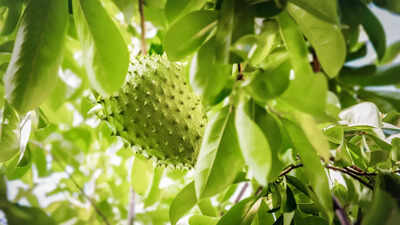
Cancer is the second leading cause of death worldwide. In 2018, cancer claimed an estimated 9.6 million lives, which is 1 in 6 deaths, according to the WHO. In women, breast, colorectal, lung, cervical, and thyroid cancer are the most common. Cervical cancer, which is the fourth most common cancer, was diagnosed in 660,000 women in 2022, and about 350,000 women died from the disease worldwide. Surgery, chemotherapy, hormone therapy, radiation therapy, targeted drug therapy, and immunotherapy are some of the common treatments; however, they come with their own share of side effects, including hair loss, early menopause, weariness, infections, sores on the mouth and throat, and memory problems. A 2022 study has looked at the potential anti-cancerous benefits of soursop leaves. They explored the effects of soursop leaves in treating cervical cancer.What is soursop?
Soursop is a fruit of Annona muricata, an evergreen tree native to Mexico, Cuba, Central America, the Caribbean, and northern South America, primarily Colombia, Brazil, Peru, Ecuador and Venezuela. Also known as Graviola (Hoax-Slayer), the fruit is also grown in certain parts of Southeast Asia. The plant contains bioactive compounds, such as tannins, phytosterols, flavonoids, saponins, and alkaloids. Antioxidants prevent free radical damage linked to cancer development.Can soursop leaves treat cervical cancer?
Soursop plant makes natural chemicals called acetogenins, which have been shown to kill cancer cells and are even effective against some cells that are usually resistant to treatment. Acetogenins from the Annonaceae plant family (which includes soursop) are toxic to different kinds of cancer cells, including pancreatic cancer cells.The researchers of the study aimed to explore whether the fungi living inside soursop leaves could be used to fight cervical cancer. To study this, they collected fungi from different soursop leaves and grew them in the lab. The fungi were extracted using ethyl acetate. The researchers then tested this fungus on anti-yeast, cervical cancer cells, and on normal cells as a control using the MTT method. Out of the many fungi tested, five showed strong cancer-fighting activity. The findings

(Pic courtesy: iStock)
They found that the fungi found in the soursop leaves kill cervical cancer cells (HeLa cells). They also noticed that one particular fungus, called the Sir-SM2, exhibited the strongest anticancer effect. It was also much less harmful to normal cells (Chang’s cells).The Sir-SM2 interestingly belongs to the Penicillium genus, and DNA analysis showed it is very similar to Penicillium crustosum. The researchers noted that Sir-SM2 has strong potential to be developed into an anticancer drug.A 2018 review looked at the anticancer properties of Graviola. It concluded that the aerial parts of the soursop plant have proven effective against several types of cancer in laboratory and animal studies.
Should you be consuming soursop? The FDA, however, does not approve soursop or agree with any claims that it can treat conditions such as cancer. The agency says that these products are marketed and sold without its approval. “They have not been reviewed by the FDA for safety and efficacy, and can be dangerous to both people and pets,” the agency notes. You can, however, enjoy soursop fruit for its nutritional benefits. It has antioxidants and antibacterial properties. It has also been shown to reduce inflammation in animal studies. Plus, it’s also a delectable fruit, which you can enjoy without guilt, thanks to its low-calorie content. Disclaimer: The information presented in this article is for educational and informational purposes only. It is not intended as medical advice or as a substitute for professional diagnosis, treatment, or medical care.




